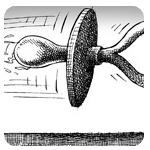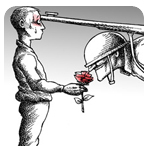Zamaneh's "Human Rights and Freedom of the Press" night
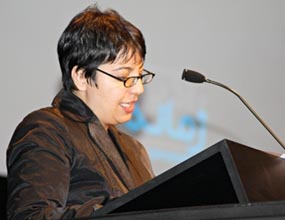
Zamaneh - Women's rights activist, Shadi Sadr
On December 8, Radio Zamaneh organized a discussion panel under the title of “Human Rights and Freedom of the Press in Iran” with the participation of prominent Iranian women’s rights activist Shadi Sadr, who was recently awarded the Dutch Human Rights Tulip for her tireless activism against stoning in Iran.
In the opening of the program, parts of Women in Shroud, a film by Farid Haerinejad and Mohammadreza Kazemi were screened. The film charts the struggles of Women’s rights activists in Iran including Shadi Sadr to fight stoning and the ordeals of some of the victims of this vicious law.
Women in Shroud was received with much acclaim at the International Documentary Festival Amsterdam where it had its world premier in November. On the occasion of the international Human Rights Day, it will also be screened for Members of the Canadian Parliament and a group of human rights activists in Canada’s Parliament Hill hosted by the speaker of the Canadian Senate and the Dutch Ambassador in Canada.
In Tuesday’s panel, Shadi Sadr, who is also one of the activists captured in Women in Shroud, discussed issues concerning human rights violations with a focus on violations of women’s rights in Iran.
Ms. Sadr, who is a lawyer and women’s rights activists, has been imprisoned on two occasions by the Iranian authorities including once during the recent election protests in Iran.
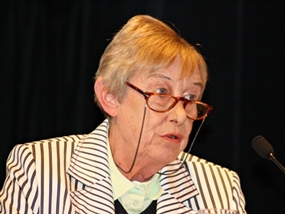
Zamaneh - former human rights reporter of Dutch Embassy, Tehran, Loes Bijnen
Ms. Sadr maintained that outside of Iran the issue of Iran’s nuclear activities has overshadowed the problem of human rights violations in the Islamic Republic. She proposed that political and cultural sanctions against Iran would be an effective way of putting pressure on the Iranian government.
She described cultural sanctions as exclusion of cultural groups backed by the Iranian government from participating in international events such as festivals and various European programs.
She also emphasized on political boycotting of Iran. She proposed that barring people who are directly or indirectly involved in the violent treatment of protesters in Iran from entering Europe can also be an effective move.
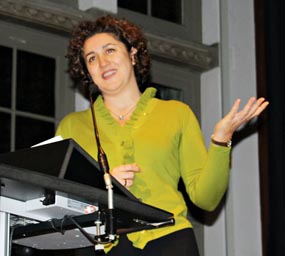
Zamaneh - panel moderator, Halleh Ghoreishi
Following her speech and Pejman Akbarzadeh's piano performance, Loes Bijnen (former human rights reporter of Dutch Embassy, Tehran), Amal Von Hees (Amnesty International) and Bijan Moshaver (board chairman of Radio Zamaneh) discussed several topics concerning human rights violations in a discussion panel moderated by Halleh Ghoreishi, Professor of Diversity Management and Integration at VU.
In conclusion, Harry Von Bommel, representative of Dutch Socialist Party and Martijne Van Dam, representative of Dutch Labour Party joined the panel to discuss the international disputes over Iran’s nuclear activities and its connection with human rights issues.

Dutch Member of Parliament, Harry Von Bommel
Shadi Sadr maintained that events such as the night’s program can have a very positive role in supporting human and women’s rights struggles in Iran. She also pointed out that the post-election protests to the alleged vote-rigging in the June presidential election have influenced all social movements within the country and the women’s movement in Iran is very much tied with the general movement for democracy and freedom.
“Many women’s rights activists are of the mind that their struggles for women’s rights should be pursued from within the wider movement for freedom and democracy and women will be able to attain their goals from within this movement. When we see a majority of women in the forefront of this popular struggle openly expressing their gender specific issues, it is up to the women’s movement to read and highlight these demands and demonstrate that these are indeed women who are fighting so courageously with their specific needs and demands.”
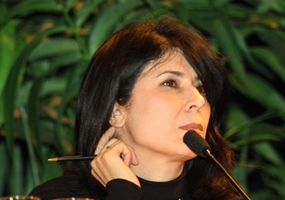
Zamaneh - Amnesty International representative, Amal Von Hees
Shadi Sadr, in collaboration with international women’s rights groups, is in the process of organizing a fact finding commission to probe into the violations of women’s rights in Iranian prisons specifically cases of rape and torture of female detainees. She explained the need for such a commission as follows:
“Members of this committee will be based both inside and outside Iran. It will be an international Commission with the specific goal of preparing cases for legal action against perpetrators of rape and sexual torture of female political prisoners in Iran in the past 30 years. The post-election events have exactly brought home the necessity of such a process. It is now evident for all of us that without prosecution of human rights violators who have been systematically violating citizens’ rights in Iran every day, the democratic process in Iran will be incomplete and won’t reach its goal. One of the main demands of the people in the current post-election protests is that people who were involved in the killing and the rape and torture of prisoners should be identified and tried.”
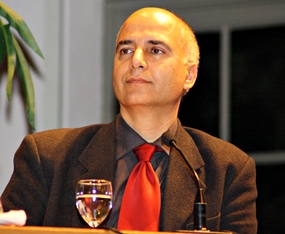
Zamaneh - board chairman of Radio Zamaneh, Bijan Moshaver
In conclusion being asked by Zamaneh about whether she would return to Iran, she said:
“As yet I have not made a definite decision about it. I believe it will depend on Iran’s situation and also my personal sense about where I would be more effective and helpful for the advancement of the people’s movement, within Iran or abroad. And right now with the opportunities that have been presented to me, I could perhaps be a voice to deliver abroad the message of the daily human rights violations in Iran. Perhaps I could be instrumental in changing international policy toward supporting the people’s movement in Iran.”
|








